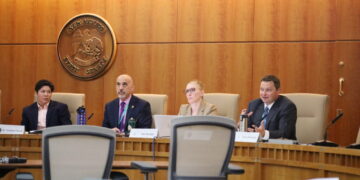U.S. Senate Majority Leader John Thune, R-S.D., left, listens as Sen. Mike Crapo, R-Idaho, speaks to reporters outside of the West Wing of the White House on June 4, 2025 in Washington, D.C. after a meeting with President Donald Trump. (Photo by Anna Moneymaker/Getty Images)
WASHINGTON — U.S. Senate Republicans suffered a significant setback Thursday when the parliamentarian ruled several changes to Medicaid in the “big, beautiful bill” don’t comply with the complex rules for moving a reconciliation package — which means billions of dollars in savings are no longer available for the GOP to offset the cost of tax cuts.
Finance Committee Chairman Mike Crapo. R-Idaho, must rework or completely eliminate nine changes the committee proposed to the health care programs, though more of the panel’s proposals are still under review.
Republicans can no longer reduce the amount of federal matching funds for state governments that use their own tax dollars to provide Medicaid coverage for immigrants in the country without proper documentation.
The GOP bill cannot bar gender-affirming care for Medicaid patients.
And Republicans need to change or scrap a proposal to reduce states’ Medicaid provider tax credits, an issue that is relatively in the weeds of health care policy but has sharply divided the GOP and drawn fierce opposition from states.
The changes or eliminations will have a major impact on how much in savings the GOP tax and spending cut bill will generate during the next decade and will likely make the overall package’s deficit impact higher than before. The legislation is intended to extend the 2017 tax cuts and make spending reductions.
The ruling might make it more difficult for President Donald Trump and GOP leaders in Congress to get the votes needed to pass the bill at all, let alone before their self-imposed Fourth of July timeline. Senate GOP leaders had said they wanted to begin procedural votes as soon as Friday.
The measure already had been stuck on Wednesday amid growing disputes over how Medicaid changes will impact rural hospitals and far more.
Democrats react
Senate Budget Committee ranking member Jeff Merkley, D-Ore., who released the parliamentarian’s rulings, wrote in a statement that Democrats will continue to advocate for removing dozens of proposals from the bill that they believe don’t meet reconciliation rules.
“Republicans are scrambling to rewrite parts of this bill to continue advancing their families lose, and billionaires win agenda, but Democrats stand ready to fully scrutinize any changes and ensure the Byrd Rule is enforced,” Merkley wrote.
A staffer, who was granted anonymity to discuss the chairman’s plans, said the Finance Committee will “rework certain provisions to address the Byrd guidance and be compliant with reconciliation.”
The Byrd rule, named for former West Virginia Sen. Robert Byrd, includes several guardrails for reconciliation bills.
Finance Committee ranking member Ron Wyden, D-Ore., wrote in a statement that the parliamentarian’s ruling will lead to “more than $250 billion in health care cuts removed from the Republicans’ big bad bill.
“Democrats fought and won, striking health care cuts from this bill that would hurt Americans’ walking on an economic tightrope. This bill is rotten to its core, and I’ll keep fighting the cuts in this morally bankrupt bill until the end.”
The parliamentarian is still deciding whether several health provisions meet reconciliation rules, including language that would block all Medicaid funding from going to Planned Parenthood, effectively blocking Medicaid patients from visiting the organization for routine health services.
Federal law already bars funding for abortions with exceptions for rape, incest, or the life of the pregnant patient.
The parliamentarian will also decide later whether Republicans’ bill can block the Department of Health and Human Services from implementing a Biden-era rule that would require nursing homes to have a nurse working 24 hours a day, seven days a week.
Higher ed provisions axed
The parliamentarian also struck down several attempts from congressional Republicans to overhaul the higher education system.
GOP lawmakers cannot streamline student loan repayment options to just a standard repayment plan or an income-driven repayment plan, a key education-related provision.
Republicans have to nix a proposal that opened up the Pell Grant — a government subsidy that helps low-income students pay for college — to those enrolled in institutions that are not accredited.
The parliamentarian scrapped a proposal that would have barred payments made by students enrolled in a medical or dental internship or residency program from counting toward Public Service Loan Forgiveness.
The federal program eliminates remaining debt for borrowers when meeting certain requirements, including working for a qualified employer within the government or nonprofit sector.
The parliamentarian rejected GOP lawmakers’ proposal to end federal student aid eligibility for certain immigrants who are not U.S. citizens.
‘Too many Medicaid cuts’
Missouri Republican Sen. Josh Hawley said the parliamentarian’s ruling on the Medicaid provider tax rate will give lawmakers “a chance to get it right.”
“This is a chance for the Senate to fix a problem that they created and not defund rural hospitals,” Hawley said, later adding he supports the House language that would freeze the rate at 6% instead of decreasing it to 3.5% over several years.
Hawley said he expects Trump to get more involved in negotiations now that he’s back from a NATO conference in Europe and said Trump was in a “terrific mood” during a recent phone call.
“I think he wants this done. But he wants it done well. And he does not want this to be a Medicaid cuts bill,” Hawley said. “He made that very clear to me. He said this is a tax cut bill, it’s not a Medicaid cuts bill. I think he’s tired of hearing about all these Medicaid cuts, you know. As am I. It’s because there are too many Medicaid cuts.”
White House press secretary Karoline Leavitt said during a briefing that Trump is “adamant” Congress must pass the “big, beautiful bill’ within the next week, despite the latest ruling.
“We expect that bill to be on the president’s desk for signature by July Fourth. I know there was a ruling by the Senate parliamentarian this morning,” Leavitt said. “Look, this is part of the process, this is part of the inner workings of the United States Senate. But the president is adamant about seeing this bill on his desk here at the White House by Independence Day.”
This post was originally authored and published by Jennifer Shutt, Shauneen Miranda from AZ Mirror via RSS Feed. Join today to get your news feed on Nationwide Report®.



























